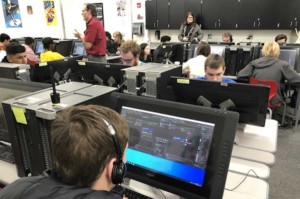5 Key Entrepreneurial Opportunities in Education
Nathaniel Whittemore at Change.org has put together a list of what he feels are the five important changes for entrepreneurs in education. More important that him making the list is his ability to point out that people often get very upset about bringing entrepreneurship into education. He notes a colleague of his at Change.org had written previously that thinking entrepreneurially distracts people from focusing on great solutions that already exist. Whittemore is right to point out that, in fact, entrepreneurship does not do this. I think he is right on when he gets to numbers three and four. Here is his list:
1. Access to funding for higher education: One of the biggest crises around the world is the access to funding for advanced degrees.
2. Supplemental learning tools: It is generally accepted that boredom in the classroom is a major, major problem. Students don’t feel like the work they’re doing is related to their real life, and the way material is presented tends to be all about getting through tests. There is a huge opportunity for supplemental learning tools that work in the classroom or out and supplement the work that teachers are already doing. One interesting example is TeacherMate, a handheld computer designed to engage hard to reach learners and sync directly with in-class lessons that is being used by 40,000 students in 35 states.
3. Efficiency tools for teachers and administrators: It’s not just students who have a hard time with schools as they’re structured today. Teachers and administrators deal with a ton of students, each of whom deserve individual care but who get dumped in with everyone else. Startups like Drop the Chalk are trying to make it easier for teachers to measure student progress and understand how different types of lessons impact students in different ways.
4. Supplanting educational structures: Many of the problems of education have to do with the school systems “monopoly” on learning. Put differently, most people get in the mindset that they’re only supposed to learn while in school. The internet is an incredible platform for distributing knowledge. Platforms like Supercool School and eduFire make it easy for people to teach and learn together. Another online learning platform, Udemy, recently released a collection of 600 lectures from top universities. TED Talks have been viewed a few hundred million times. And so on.
5. Tools for parents: I don’t know much about activity going on in this domain, but parents are an essential part of the educational experience. There is a definite opportunity for startups focused on supporting parents with pre-school education, and there is probably also an opportunity to make it easier for parents and teachers collaborative to help customize student learning.
If you are an education entrepreneur, where would you point Nathaniel to expand this list? I think he is clearly leaving out a whole host of social network capabilities, and the tools that create what many are calling blended learning. Companies like the Revolution Learning portfolio company Edmodo, for one.




Crudbasher
One thing I think there is a big need for is a simple, lifelong ePortfolio system. Something students start when they are young and keep all their work. This should be independent of schools. Some of this happens in LMS systems but it's always locked in a school's box.
Douglas Crets
You make a good point. In fact, in China, they are building a system like this in open source at a Journalism and Communications school in Guangdong Province. They are doing this for more than two reasons, but here are the two that I know:
1. Lack of money for commercial products that come with a price tag
2. China's general openness to entrepreneurial solutions to critical problems in infrastructure and education
Knack For Teachers
Completely agree that there are a lot of opportunities in education, especially for technology. #5 is interesting because some parents just don't know how to help their children study. It's not a question of whether they are good parents—they just don't know how to help. A tool targeted at this specifically is thought-provoking.
I just recently launched a web app that fits under category #3 called Knack For Teachers (http://KnackForTeachers.com). My goal is to help teachers be more efficient and prove their effectiveness.
Replies
Douglas Crets
Thanks for pointing us to your app. I think an interesting challenge (though not a business challenge) for education is how do you get parents and communities to participate in the educational lives of children, not as authorities, but as active and participatory learners?
What the web shows in its operations is that everyone can teach each other. There should be more back and forth between school and community in this vein.